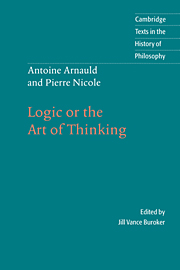Book contents
- Frontmatter
- Contents
- Acknowledgments
- Introduction
- Chronology
- Further reading
- List of works cited in the text and notes
- Note on the text and translation
- Logic or the Art of Thinking
- Preface
- Foreword
- First discourse
- Second discourse
- First part, containing reflections on ideas
- Second part of the Logic, containing reflections people have made about their judgments
- Third part of the Logic, on reasoning
- Fourth part of the Logic, on method
- Index
- Cambridge texts in the history of philosophy
First discourse
Published online by Cambridge University Press: 05 June 2012
- Frontmatter
- Contents
- Acknowledgments
- Introduction
- Chronology
- Further reading
- List of works cited in the text and notes
- Note on the text and translation
- Logic or the Art of Thinking
- Preface
- Foreword
- First discourse
- Second discourse
- First part, containing reflections on ideas
- Second part of the Logic, containing reflections people have made about their judgments
- Third part of the Logic, on reasoning
- Fourth part of the Logic, on method
- Index
- Cambridge texts in the history of philosophy
Summary
Nothing is more praiseworthy than good sense and mental accuracy in discerning the true and the false. All the other mental qualities have limited uses, but an exact reason is generally useful in all aspects and all walks of life. It is difficult to distinguish truth from error not only in the sciences, but also in the majority of subjects people discuss and affairs they conduct. There are different routes practically everywhere, some true, others false. It is up to reason to choose among them. Those who choose well are those who are mentally acute; those who take the wrong path have faulty minds. This is the first and most important difference we can note in the qualities of people's minds.
Thus our main concern ought to be educating our judgment and making it as precise as possible. This ought to be the goal of the greatest part of our studies. We use reason as an instrument for acquiring scientific knowledge, when, on the contrary, we should use the sciences as an instrument for perfecting reason, since mental accuracy is infinitely more important than all the speculative knowledge to be attained by means of the truest and most reliable sciences. This should move wise persons to engage in speculation only to the extent that it serves this purpose, to make it merely the test and not the main use of their mental powers. [16]
- Type
- Chapter
- Information
- Publisher: Cambridge University PressPrint publication year: 1996



